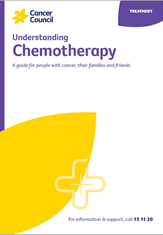- Home
- Cancer Information
- Cancer treatment
- Chemotherapy
- Having chemotherapy
- Chemotherapy with other treatments
Chemotherapy with other treatments
For some types of cancer, you may be given chemotherapy as part of another treatment, such as a stem cell transplant or radiation therapy, or in combination with other drug therapies.
| high-dose chemotherapy | Usually given as part of a stem cell transplant for blood cancers, such as leukaemia or lymphoma. It kills off all the cancer cells before the new, healthy blood cells are given. The transplant usually occurs a day or two later. |
| chemoradiation | Also called chemoradiotherapy, this is when chemotherapy is combined with radiation therapy. The chemotherapy drugs make the cancer cells more sensitive to radiation therapy. Chemoradiation is commonly used for brain, bowel, cervical and oesophageal cancers. |
| hormone therapy | May be used after chemotherapy. Some cancers, such as breast and prostate cancer, can grow in response to hormones. Drugs that block these hormones may be given as tablets or injections. |
| targeted therapy | Often combined with chemotherapy, targeted therapy drugs may be given through a drip in a vein, (intravenously), injections or tablets. |
| immunotherapy | May be used in combination with chemotherapy. Immunotherapy is usually given through a drip in a vein (intravenously). |
| steroids | Often given with chemotherapy to ease or prevent nausea, manage allergic reactions, make chemotherapy more effective or directly treat the cancer. Steroids are usually given as tablets. Side effects include indigestion, increased appetite, mood swings, difficulty sleeping, increased blood glucose levels and muscle weakness. |
Podcast: Making Treatment Decisions
Listen to more of our podcast for people affected by cancer
More resources
Prof Timothy Price, Medical Oncologist, The Queen Elizabeth Hospital, SA; Graham Borgas, Consumer: Dr Joanna Dewar, Medical Oncologist and Clinical Professor, Sir Charles Gairdner Hospital and The University of Western Australia, WA; Justin Hargreaves, Medical Oncology Nurse Practitioner, Bendigo Health Cancer Centre, VIC; Angela Kritikos, Senior Oncology Dietitian, Dietetic Department, Liverpool Hospital, NSW; Dr Kate Mahon, Director of Medical Oncology, Chris O’Brien Lifehouse, NSW; Georgie Pearson, Consumer; Chris Rivett, 13 11 20 Consultant, Cancer Council SA; Marissa Ryan, Acting Consultant Pharmacist (Cancer Services), Pharmacy Department, Princess Alexandra Hospital, QLD.
View the Cancer Council NSW editorial policy.
View all publications or call 13 11 20 for free printed copies.
Need to talk?
Support services
Work and cancer
Information for employees, employers and workplaces dealing with cancer
Looking for transport, accommodation or home help?
Practical advice and support during and after treatment
Cancer information
Cancer treatment
Learn more about common cancer treatments, such as surgery, radiation therapy, targeted therapy, and more.
Making cancer treatment decisions
Decision-making steps, consent and second opinions

